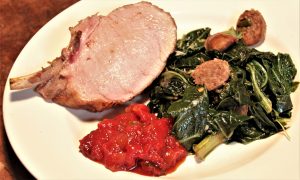My friend Don Abrams recently gave me a very cool cookbook. It’s called “The New Orleans Cookbook,” by Rima and Richard Collins and was published in 1975, but it has a much older feel to it. It is strictly a Cajun and Creole cookbook (I hope you never confuse the two!), so don’t look for any Pacific Rim Fusion here, but it’s a delightful book and one I think any serious foodie would enjoy perusing. You will find a lot of dishes that we think of as local in this cookbook, in fact, what we borrowed from the Creoles and Cajuns is pretty much the foundation of our food culture.

We don’t have a lot in common with our neighbors north of Interstate 10, but we have borrowed heavily from their cookbooks as well. Collard greens, sweet Vardaman grown sweet potatoes (which claims to be the sweet potato capital of the world), Delta grown rice, Delta Blues Rice is my favorite (find it at Rouses), peas and beans, cornbread and much more can be found frequently on Coastal tables.
What an amazing mishmash of culinary traditions and what a blessing to live in such a diverse culinary scene, but the French may have given us more than most others. Did you know that the origins of our boiled seafood tradition are French? The French call the basic recipe court bouillon (koor-boo-yawn), a method of quick cooking seafood in a seasoned stock. So where did gumbo come from? Many think it was the famous seafood stew made by the fishermen of Marseille, bouissebase. What about daube spaghetti? Its another French recipe for braising beef, frugal Coast cooks added the pasta to make it go a little further. We owe a lot to the French, the first Europeans to come this way.
I think you see the point I am trying to make. I am not telling you to never cook French or Italian, but I am suggesting that you glory in the abundance we have. Go to the Saturday morning Fresh Market in Ocean Springs. But shrimp right off the boat at one of our harbors. Take a good look at the recipes that we are known for, use the best ingredients you can find, use the best technique, and blow your guest from out of town away.
And make sure to check out the cookbook don gave to me, “The New Orleans Cookbook.”